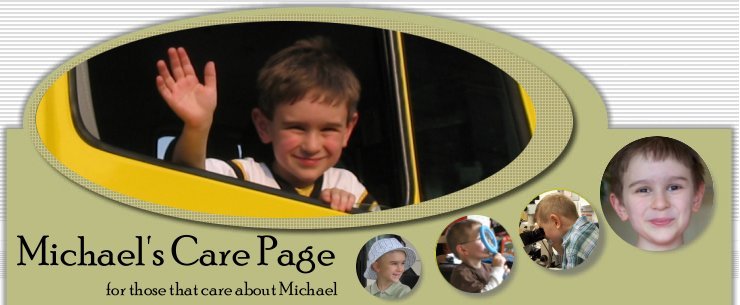When Dr. Pilcher gave us Michael's diagnosis of a pediatric brain tumor, one of my first questions was "Is he going to survive?" Dr. Pilcher responded that he has several patients that received the same diagnosis as Michael at a young age and that they were now young adults. So, yes, he believes he will. But he added that even if things don't go as planned, every day we buy Michael brings new and exciting treatments and cures.
I came across the following article online in the British newspaper, The Telegraph, and it brings me hope that someday (hopefully very soon) they will be able to do something similar with brain tumors. (I have read where they are working with something like this in brain tumor patients in Switzerland.) My greatest hope is that Michael will not only reach adulthood but be able to lead a full and happy life free of the threat of his tumor advancing (I've never been one to dream small!). And that he can do so without further surgeries or poisonous drugs. This story gives me that hope:
Cancer patient recovers after injection of immune cells
By Roger Highfield, Science Editor
A cancer patient has made a full recovery after being injected with billions of his own immune cells in the first case of its kind, doctors have disclosed.
The 52-year-old, who was suffering from advanced skin cancer, was free from tumours within eight weeks of undergoing the procedure.
After two years he is still free from the disease which had spread to his lymph nodes and one of his lungs.
Doctors took cells from the man's own defence system that were found to attack the cancer cells best, cloned them and injected back into his body, in a process known as "immunotherapy".
Experts said that the case could mark a landmark in the treatment of cancer.
It raises hopes of a possible new way of fighting the disease, which claims 150,000 lives in Britain every year.
Ed Yong, health information manager at Cancer Research UK, said: "It's very exciting to see a cancer patient being successfully treated using immune cells cloned from his own body. While it's always good news when anyone with cancer gets the all clear, this treatment will need to be tested in large clinical trials to work out how widely it could be used."
However, the treatment could prove extremely expensive and scientists say that more research is needed to prove its effectiveness.
Genetically altered white blood cells have been used before to treat cancer patients but this is the first study to show that simply growing vast numbers of the few immune cells in the body to attack a cancer can be safe and effective.
Normally there are too few of the cells in a patient's body to effectively fight cancer.
Dr Cassian Yee, who led the team at the Fred Hutchinson Cancer Research Centre in Seattle, said: "For this patient we were successful, but we would need to confirm the effectiveness of therapy in a larger study."
The work raises hopes that this approach could not only offer a more effective treatment for skin cancer, or melanoma, which kills around 2,000 people in Britain alone, but be applied to other cancers too.
The patient was one of nine with metastatic melanoma, that is skin cancer that has spread, who were being treated in a recently completed clinical trial to test bigger and bigger doses of their own white blood cells.
Larger, more elaborate, trials are now under way.
Almost 9,000 new cases of melanoma, the most serious form of skin cancer, are diagnosed every year in Britain, and nearly 2,000 patients die from the disease.
Prof Peter Johnson, Cancer Research UK's chief clinician, said: "This is another interesting demonstration of the huge power of the immune system to fight some types of cancer.
"Although the technique is complex and difficult to use for all but a few patients, the principle that someone's own immune cells can be expanded and made to work in this way is very encouraging for the work that Cancer Research UK and others are carrying out."
Immunotherapy, in which a patients own immune cells are used to treat cancer, is a growing area of research that aims to develop less-toxic treatments than standard chemotherapy and radiation.
Because cancer occurs when the body's own cells grow out of control, the immune system only responds weakly.
The ability of the body's own defences to tackle cancer in this case is all the more remarkable because most deadly feature of the disease is its ability to colonise other parts of the body, when it becomes much more difficult to treat.
A dramatic example of immunotherapy was reported two years ago by one pioneer of the field, Dr Steven Rosenberg of the US National Cancer Institute, who eradicated cancer from two dying men using genetically modified versions of their own cells.
Both Mark Origer and "Thomas M" were suffering from advanced melanoma but the hope is that such methods could be customised to attack other common cancers, notably breast, colon and lung.
Dr Rosenberg told The Daily Telegraph the new work is an "interesting study that helps to confirm the effectiveness of cell transfer immunotherapy for treating cancer patients. We have now treated 93 patients with metastatic melanoma using their own anti-tumour cells with response rates up to 72 per cent. Mark Origer remains disease free now over three years after treatment."
Please keep Michael in your thoughts and prayers, JoAnne
Friday, June 20, 2008
Subscribe to:
Post Comments (Atom)
.jpg)



1 comment:
There is hope... There is grace... There is prayer.. There is a sweet adorable little boy full of life, Michael! Thank you Lord... Susie H~
Post a Comment